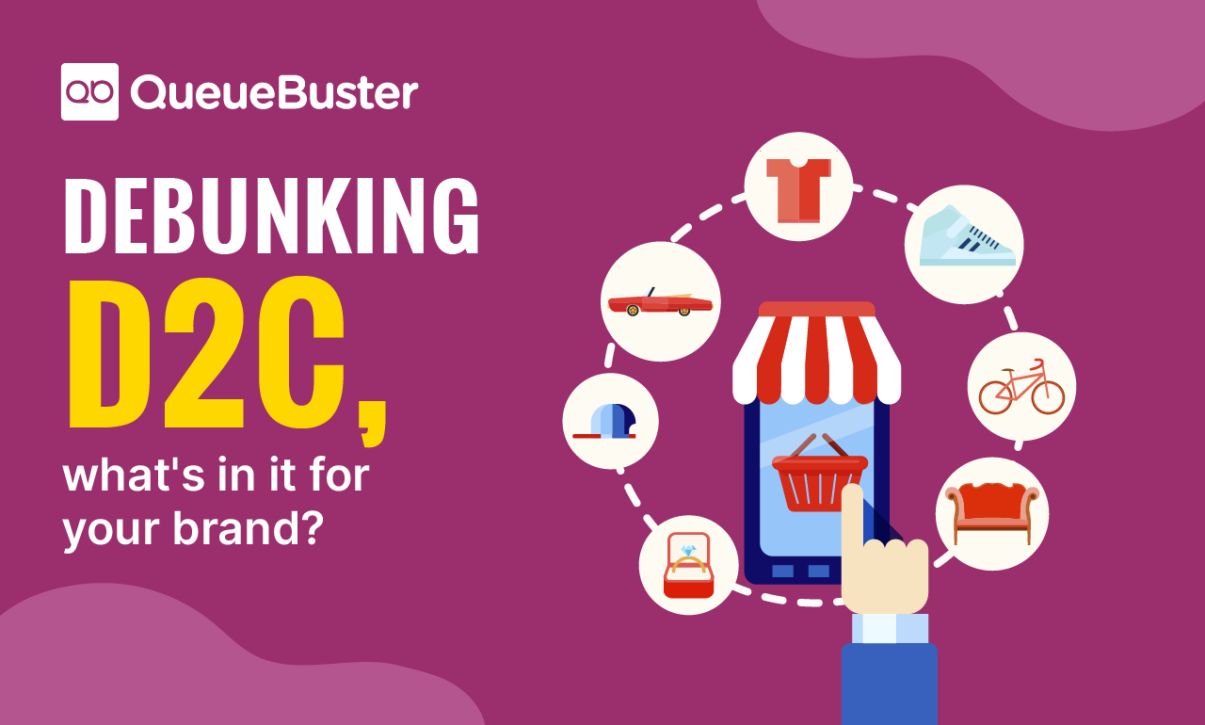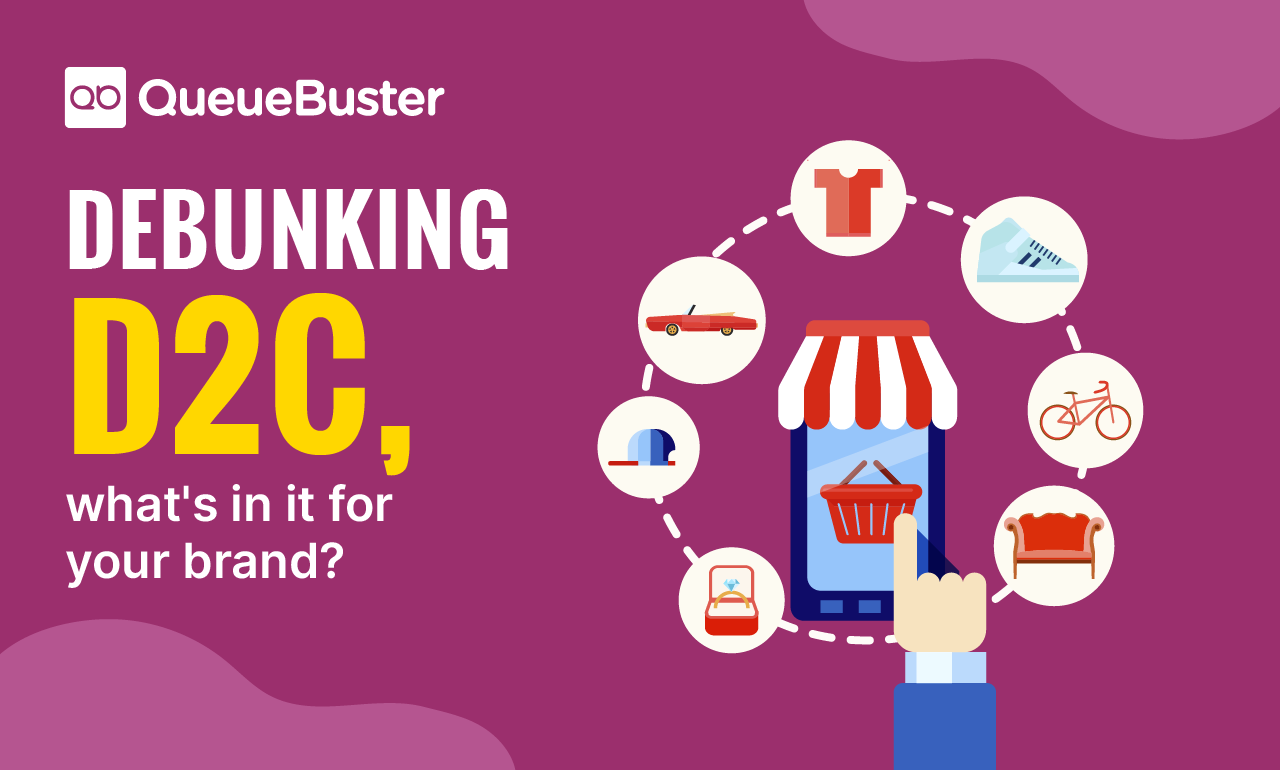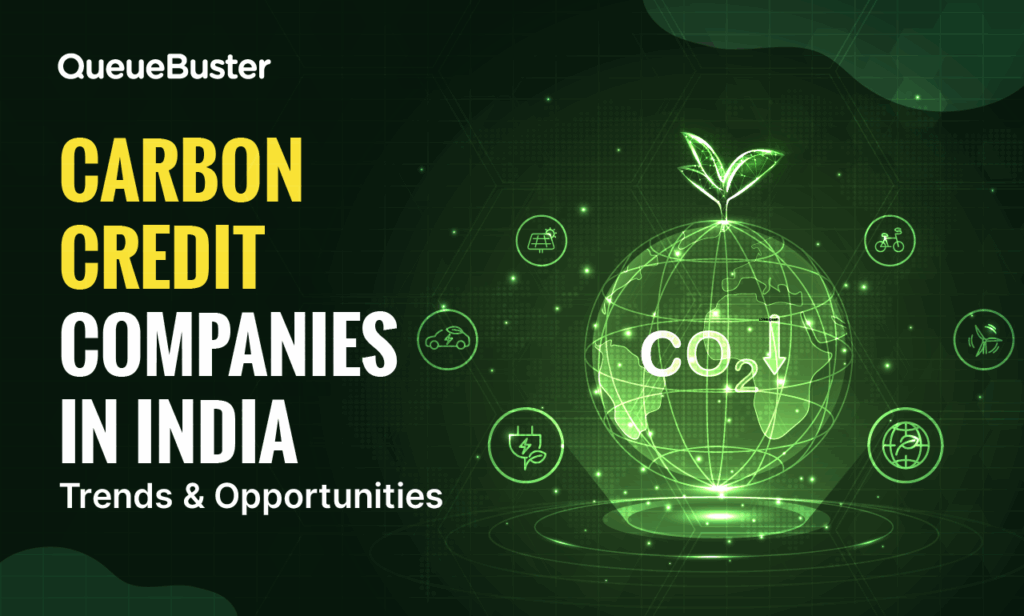
What Is D2C (Direct-To-Consumer) Marketing and Why Should Your Brand Consider It?
What Is D2C (Direct-To-Consumer) Marketing and Why Should Your Brand Consider It?

By QueueBuster Team Published: May 1st, 2024
Direct-to-consumer (D2C) marketing is a powerful strategy for businesses looking to reach and build relationships with their target audience. It has become increasingly popular in recent years due to the rise of eCommerce and new technology that makes it easier than ever to launch a D2C campaign. By selling directly to customers, brands can cut out middlemen and maximize the profits from each sale.
This allows them to better use their resources for customer service, product development, and other activities that will create brand loyalty. Additionally, D2C marketing gives brands more control over the customer experience, which can lead to increased customer satisfaction and ultimately more sales. In this blog post, we’ll discuss what D2C marketing is, why your brand should consider it, as well as some tips on how you can make the most of it.
What is D2C marketing?
D2C marketing is a type of marketing that focuses on creating a direct connection between the brand and the consumer. This can be done through various channels, such as social media, email, POS applications, or even through a brand’s website.
Error: Contact form not found.
D2C marketing allows brands to build a more personal relationship with their consumers and create a more seamless customer experience. It also gives brands more control over their message and how they are portrayed to their audience.
There are many benefits to D2C marketing, but it is important to consider if it is the right fit for your brand before investing. If you do decide to pursue D2C marketing, there are some key things to keep in mind in order to be successful.
Some of the most important aspects of successful D2C marketing include:
– Building a strong relationship with your consumers: This is perhaps the most important aspect of D2C marketing. To succeed, you need to build trust and loyalty with your consumers. You can do this by creating valuable and relevant content, being responsive to customer inquiries, and offering an overall great experience.
– Creating a seamless customer journey: Another key element of successful D2C marketing is creating a smooth and seamless customer journey. This means having a well-designed website or app that is easy to navigate and use, providing clear and concise information, and offering excellent customer service.
– Making sure your message is on point: As with any type of marketing, it is important to make sure your message is on point and resonates with your target audience. You need to know who your customers are and what they want to create compelling content that speaks to them.
The benefits of D2C marketing for your brand
There are plenty of reasons to consider direct-to-consumer (D2C) marketing for your brand.
- Perhaps the most obvious reason is that it allows you to build a direct relationship with your customers, without going through intermediaries. This means you can communicate with them directly, and gather feedback and data more easily.
- It also gives you greater control over how your brand is presented and marketed, as well as the customer experience. And since you’re dealing directly with customers, it’s easier to tailor your marketing efforts (and products/services) to their specific needs and wants.
- In terms of ROI, D2C marketing can be very effective, since you’re able to track results much more closely than with traditional marketing channels. And because you have a direct connection with customers, it’s easier to upsell and cross-sell them on other products/services that they might be interested in.
So if you’re looking for a more efficient and effective way to market your brand, D2C just might be the answer.
How to create a successful D2C marketing strategy?
To create a successful D2C marketing strategy, there are a few key things you need to keep in mind.
- First and foremost, you need to have a clear understanding of your target audience and what they want or need from your brand. Once you know this, you can craft a marketing strategy that resonates with them and speaks to their specific needs.
- Another important element of a successful D2C marketing strategy is staying true to your brand identity. Your customers should be able to easily identify your brand and what it stands for, so make sure your messaging is consistent across all channels.
- Finally, don’t forget about the power of word-of-mouth marketing. If your customers are happy with your products or services, they’ll be more likely to recommend you to their friends or family. Make sure you’re constantly asking for feedback and working to improve the customer experience.
Case studies of successful D2C brands
Some successful D2C brands that have used this approach include Warby Parker, Bonobos, and Everlane.
- One of Warby Parker’s most successful marketing campaigns was its “Home Try-On” program. Launched in 2012, the program allowed customers to order five pairs of glasses online and try them out at home for free. This not only made Warby Parker stand out from their competition, but it also encouraged people to try on the glasses and see how they looked before making a purchase.
- In 2018, Bonobos launched the “Date Night Done Right” campaign to help guys look their best on date night. The campaign included a series of videos and articles offering style tips and advice. It also offered discounts on Bonobos clothing when users entered the code “DATE NIGHT.”
- In 2015, Everlane launched its “Choose What You Pay” campaign, which allowed customers to pay what they wanted for select items. The campaign was a success, and Everlane has continued to find innovative ways to connect with its customers and create a positive impact on the world.
The future of D2C marketing
As the world of marketing continues to evolve, so too does the direct-to-consumer (D2C) model. What started as a way for brands to connect with customers without going through a middleman has now become one of the most effective marketing strategies available. And it’s only going to become more popular in the years to come.
There are several reasons why D2C marketing is on the rise:
- For one, customers are becoming savvier and are demanding more transparency from brands. They want to know where their products come from, how they’re made, and who they’re supporting when they make a purchase.
- D2C brands can provide this level of transparency because they control every step of the production and distribution process. They’re also able to build closer relationships with their customers since there’s no intermediary between them.
- Another reason D2C is gaining popularity is that it’s an incredibly efficient way to market a product or service. Since there’s no need to go through distributors or retailers, D2C brands can sell directly to consumers at a much lower cost. This means they can invest more in other areas of their business, like product development or customer service.
- Finally, D2C allows brands to collect data directly from their customers. This data can be used to improve the customer experience, develop new products, and create targeted marketing campaigns. In other words, D2C helps brands learn exactly what their.
Conclusion
D2C marketing has the potential to completely revolutionize your business’s bottom line. By leveraging digital channels and data to create personalized customer experiences, brands can build loyalty while increasing their reach and profitability.
If you are looking to upgrade your D2C brand, try the QueueBuster app. It is a Full-Stack POS application that manages everything from billing, inventory, khata, online dukaan, customers, loyalty, & more. Book a demo of QueueBuster today to transform your business with the power of D2C marketing.
Popular Posts

Carbon Credit Companies in India: Driving Climate Action Through Innovation
As India accelerates toward sustainable development and net-zero targets, carbon credits are […]

Return Inwards & Outwards: Meaning & Examples
In a fast-paced world, inventory-driven market like India, managing your stock and […]